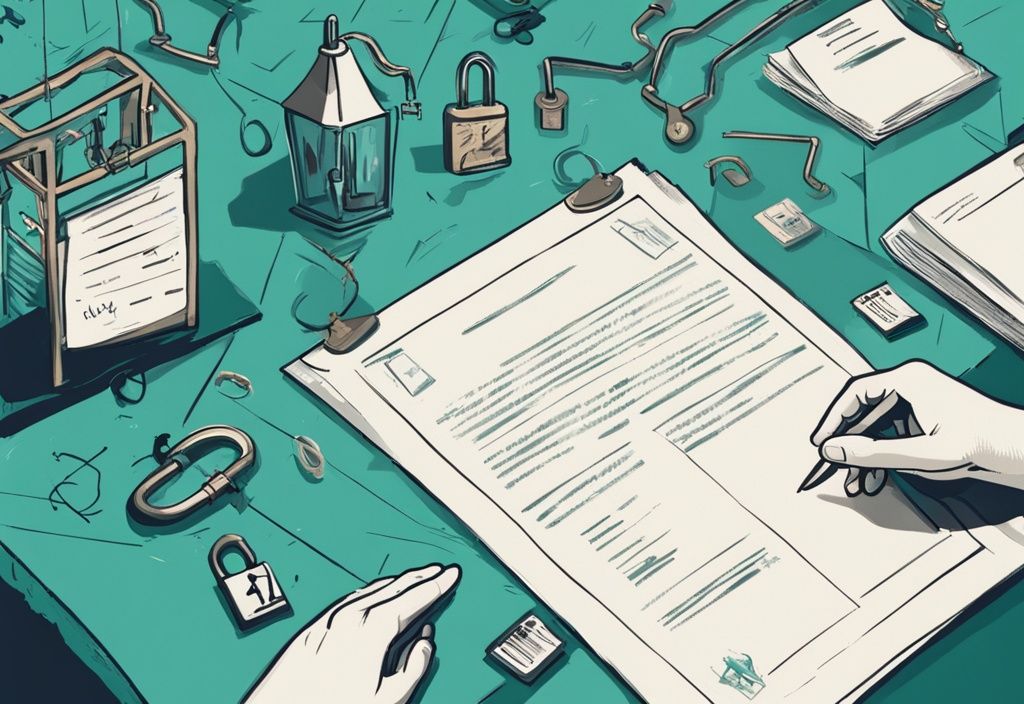Ever scratched your head, wondering what ‘under contract’ means in the real estate world? You’re not alone. This buzzword often prompts a flurry of questions, especially when it pops during transactions. I understand how overwhelming it can get – but don’t worry, I’ve got your back!
In this article, we’ll explain what it means when a property is ‘under contract,’ diving into its implications for buyers and sellers. We’ll navigate through the legal lingo and decode each step, transforming this daunting term into a manageable milestone in your property journey.
So, brave the journey with me, and you’ll be ready to confront any ‘under contract’ situation, equipped with knowledge and confidence. Now, shall we start turning legal knots into bows?
Defining ‘Under Contract’ in Real Estate
Exploring what it truly means when a property is labeled as “under contract” and diving into the legal details that come into play during this phase.
What Does ‘Under Contract’ Mean?
In real estate, when you see that a property is “under contract,” it essentially means that the seller has accepted an offer from a buyer. Think of this stage as something akin to being engaged—exciting, but not quite the wedding day!
A mutual agreement has been established, and both parties have signed a purchase and sale agreement. But, just like any good love story, there’s a journey ahead with a few hurdles to clear before reaching the final “I do” at closing.
These hurdles, or contingencies, usually include securing financing, getting the property appraised, conducting a thorough home inspection, and sometimes, selling the buyer’s existing home. Until these are resolved, the deal isn’t set in stone.
Legal Implications of Being ‘Under Contract’
When a property is under contract, it signals that binding contracts have been exchanged. This means both the buyer and seller are now legally bound to honor the terms laid out in the agreement.
However, contingencies serve as a safety net, allowing either party to walk away if certain conditions aren’t met. Imagine it like a safety valve—there to relieve the pressure just in case something doesn’t go according to plan. If these obligations aren’t met, there could be legal consequences for breaching the contract.

This phase requires a clear understanding of commitments from both buyer and seller to steer clear of unforeseen legal hassles. It’s all about knowing what you’re getting into and ensuring you can meet the agreements.
The Journey of a Real Estate Contract
Understanding the stages and statuses a real estate contract goes through can help make the process less daunting and more transparent.
Steps from Initial Offers to Becoming ‘Under Contract’
The journey of a real estate contract begins when a buyer makes an initial offer on a property. This offer outlines the proposed purchase price and any conditions the buyer intends to include.
From this point, negotiations commence. Both the buyer and seller discuss and adjust the terms to reach a mutual agreement. These negotiations can cover aspects such as price, closing date, and contingencies.
Once both parties are satisfied with the terms, they proceed to sign a purchase and sale agreement. At this stage, the property is officially considered “under contract. En este video, aprenderás sobre lo que significa que una propiedad esté 'under contract' en el contexto inmobiliario, incluyendo los términos que deben cumplirse antes de que la venta se complete. “ Typically, the buyer also pays an earnest money deposit, which serves as a sign of serious intent and can be applied towards the purchase price upon closing. Understanding what a real estate agent does can be crucial in navigating this process effectively.
‘Active Under Contract’ Status: What it Means
When a property is labeled “active under contract,” it signifies that while the seller has accepted an offer and the property is under contract, they are still open to receiving backup offers. This status is particularly prevalent in competitive real estate markets, where there’s a higher likelihood that the current contract might not be finalized due to unmet contingencies.
For instance, if the buyer fails to secure financing, or issues arise during the home inspection, the primary deal could fall through. By accepting backup offers, sellers keep their options open and increase their chances of successfully selling their property in a timely manner.
Transitioning from ‘Under Contract’ to ‘Pending’
The transition from “under contract” to “pending” signifies a crucial stage in the real estate transaction process. When a property is marked as “pending,” it typically means that all contingencies outlined in the purchase and sale agreement have been satisfied.
These contingencies might include financing approval, appraisal verification, and the successful completion of the home inspection. At this stage, the likelihood of the deal falling through significantly decreases, and the focus shifts towards the closing process.
It’s important to note that while “pending” and “under contract” can sometimes be used interchangeably, “pending” generally indicates that the transaction is nearing completion with fewer hurdles remaining.
Resolving Common Contract Challenges
It’s common to encounter a few bumps on the road when a property is ‘under contract.’ From inspections to financing, here’s how you can navigate these challenges confidently.
Addressing Inspection Concerns
Home inspections are a crucial part of the ‘under contract’ phase, spotlighting issues that might not be immediately noticeable. These inspections give buyers an essential layer of protection, offering them the chance to thoroughly scrutinize the property’s condition.

Imagine you’re eyeing a charming old house. An inspection reveals the roof needs significant repairs. Suddenly, your excitement might wane. But here’s the silver lining: you can request the seller to either make the repairs or lower the price to cover the costs. This leverage can be a game-changer, especially if major repairs like fixing structural damage or replacing outdated electrical systems are required.
Now, suppose the inspection uncovers severe issues that negotiations can’t fix, such as extensive water damage or a crumbling foundation. In that case, you have the right to terminate the contract. This flexibility underscores why a detailed, professional inspection is non-negotiable.
Overcoming Financing Roadblocks
Securing financing is another pivotal step in the real estate journey, often accompanied by its set of hurdles, so it’s essential to talk to a mortgage broker or lender early on. For guidance on how to prepare to buy a home, check out this helpful resource on prequalifying for a mortgage. A financing contingency in your contract requires you to obtain a mortgage to proceed with the purchase.
Think of loan pre-approval as your gold star. It tells sellers you’re financially ready to back up your offer, bolstering your position in a competitive market. Yet, despite all this preparation, sometimes financing falls through. Maybe there’s an unexpected change in your financial situation, or issues crop up during the final approval stages.
In such scenarios, if a financing contingency was part of the contract, you can withdraw without penalty. This safety net ensures that even when unexpected financial hurdles arise, there’s a clear path forward for both buyers and sellers.
Strategies for Buyers and Sellers with ‘Under Contract’ Homes
Understanding the strategies for both buyers and sellers when a home is ‘under contract’ can be instrumental in navigating the often unpredictable real estate market. Whether contemplating making an offer on a contracted property or deciding on accepting backup offers, these insights offer clarity and direction.
Is it Wise to Make Offers on ‘Under Contract’ Properties?
Making an offer on a property that’s already under contract can indeed be a savvy move, especially in a competitive market. So, what does ‘under contract’ mean in real estate? Simply put, it indicates that the seller has accepted an offer, and the sale is now contingent on meeting specific conditions such as financing, inspections, and appraisals. However, these contingencies might not always be satisfied, causing the primary deal to sometimes fall through.
Imagine you’ve got your heart set on a home under contract. Consulting with your real estate agent can provide crucial insights into whether the initial deal is likely to last or collapse. Agents can assess the strength and stability of the existing contract. If the current deal seems shaky, putting in a backup offer might just secure you the property if the primary offer fails. This strategy can help you avoid the fierce bidding wars typical of more straightforward listings, positioning you advantageously.
Should Sellers Accept Backup Offers?
For sellers, accepting backup offers can act like an insurance policy against potential deal failures. Even when a home is under contract, there’s always the risk that the conditions won’t be met, causing the deal to fall apart. Having backup offers means there’s another buyer ready to step in if things go south.
Before accepting backup offers, it’s essential for sellers to gauge the stability of their current deal. Consider the buyer’s financial stability, the outcome of property inspections, and the progress on contingencies. Understanding these aspects helps sellers judge the likelihood of the initial contract falling through.
Backup offers don’t just provide a safety net—they also create urgency for the primary buyer to meet contingencies swiftly. This added pressure can help resolve issues quickly, keeping the transaction on track. Ultimately, accepting a backup offer keeps momentum going, giving sellers extra leverage and peace of mind.
So, whether you’re buying or selling, understanding the dynamics of ‘under contract’ homes can empower you to make informed, strategic decisions in the real estate landscape.
How Real Estate Agents and Legal Professionals Can Help
The Value of a Real Estate Agent During ‘Under Contract’ Phase
Real estate agents are absolute lifesavers during the ‘under contract’ phase, offering expert guidance to both buyers and sellers. Imagine a seasoned guide, navigating the complexity of the contract process while ensuring that all parties are informed and stay on course. They adeptly handle negotiations, whether it’s talking about necessary repairs, tweaking the purchase price, or juggling various timelines to keep the deal moving forward.
Think of them as your personal real estate sherpas. They also provide indispensable advice on the status and potential of backup offers, ensuring that you’re making well-informed decisions. By leveraging their extensive market knowledge and negotiation prowess, agents make the intricate steps toward a successful closing feel like a breeze.
Why You Need Conveyancers and Solicitors in the Process
Conveyancers and solicitors are the unsung heroes in ensuring all legal and procedural requirements are meticulously met during any real estate transaction. They’re like your legal guardians, ensuring that contracts are thoroughly reviewed and all terms are fair and legally binding. You can count on them to conduct essential title searches to confirm that the property title is free from issues or disputes.
Picture them as the meticulous scrutinizers of all necessary documentation, from drafting to filing, making sure everything complies with legal standards. Their expertise bridges the gap during the sale and settlement periods, preventing potential legal hiccups and smoothing out the entire transaction process. Having their support makes the often daunting legalities of real estate feel much more manageable.
FAQs About ‘Under Contract’ in Real Estate
What Exactly Means When a Property is ‘Under Contract’?
When a property is ‘under contract’ in real estate, it signifies that the seller has accepted a buyer’s offer and they’ve both signed a purchase and sale agreement. However, the sale isn’t final yet. There are still various contingencies, such as financing, appraisal, and home inspections, that must be satisfied before the transaction can proceed to closing.
Can Sellers Still Accept New Offers While Under Contract?
For the most part, sellers cannot accept new offers once a property is under contract. However, if the property is listed as “active under contract,” sellers can still consider backup offers. These backup offers act as a safety net if the primary deal falls through due to unmet contingencies.
Typical Duration of ‘Under Contract’ Stage in Real Estate
The ‘under contract’ stage in real estate typically lasts from several weeks to a couple of months. The duration can vary depending on how quickly financing, home inspections, appraisals, and other crucial processes are completed. Delays in negotiations or meeting contingencies can also impact the timeline.
Most Common Reasons for Real Estate Deals to Fall Through
Real estate deals often fall through for a few main reasons:
- Failed Financing: The buyer may not secure loan approval.
- Inspection Issues: Persistent problems noted during the home inspection.
- Appraisal Issues: If the home doesn’t appraise at the agreed purchase price.
- Unmet Contingencies: Commonly affecting buyers who need to sell their property first.
Conclusion
Understanding the ‘under contract’ phase is essential for both buyers and sellers in the real estate market. When you ask, “what does under contract mean in real estate?”, it’s crucial to know that this status signifies a legally binding agreement between the buyer and seller. However, several contingencies still need to be addressed.
The ‘under contract’ stage is like embarking on a meticulous journey, where every step counts. It begins with the buyer making an initial offer, followed by negotiating terms, and finally, both parties signing a purchase and sale agreement. During this phase, various legal, financial, and procedural elements come into play, such as securing financing, conducting home inspections, and fulfilling appraisal requirements. Imagine it like a well-orchestrated dance where timing and coordination are everything.
Engaging with real estate professionals during this critical phase can be immensely beneficial. Real estate agents act as your navigators through the transaction’s complexities, helping with negotiating repairs, price adjustments, and managing timelines efficiently. Think of them as your GPS, guiding you through twists and turns. Meanwhile, conveyancers and solicitors ensure all legal and procedural requirements are met. They handle contract reviews, manage documentation, and essentially make sure all the i’s are dotted and the t’s are crossed.
By understanding these aspects of what ‘under contract’ means in real estate, and leveraging the expertise of professionals, both buyers and sellers can navigate this phase more smoothly. This preparation and support help avoid common pitfalls, ensuring that each step towards closing is executed flawlessly. Ultimately, it paves the way for a seamless transition toward finalizing the sale, much like a well-planned trip reaching its destination without a hitch.
Hi, I’m Alex Harper, a real estate expert with over ten years of experience in property management and legal advice. My passion is making the often complicated world of real estate understandable. I share practical tips and simple solutions to help you make better decisions – whether you’re buying a home, renting or just want to learn more about the industry. With my knowledge and experience, I want you to feel well-informed and confident in your real estate projects. Let’s tackle this together!




